Christopher Walken is Brilliant as a Broken Man Haunted By Visions of the Future in David Cronenberg's 1983 Adaptation of Stephen King's The Dead Zone
It's Christopher Walken at his most Christopher Walkenny!
The Dead Zone opens with a hilariously off-brand Christopher Walken as Johnny Smith, an English teacher with an unmistakable Ned Flanders vibe. He’s a bespectacled goober who loves his job, loves his fiance and loves his charmed life.
That’s not the Christopher Walken we know and love. It looks like him, and has his halting, hypnotic rhythms but he sure doesn’t act like him. He’s on some Mayberry, “Up With People”, Brady Bunch, whitebread shit.
He’s introduced reading Edgar Allen Poe’s “The Raven” yet still seems like the corniest dude ever.
Then he endures unimaginable torment.
On a rain-slicked night Johnny has a car accident that doesn’t kill him but relegates him to a state worse than death. For five agonizing years he’s in a coma, his body and mind in a bleak purgatory, an unbearable no man’s land, a grim psychic hellscape he’s both lucky and unlucky to survive.
THIS is Christopher Walken. His charmed life has become a tragedy. He loses a girlfriend who understanably tired of long years of waiting, never knowing if he’d come out of the coma or if his life was fundamentally over.
He loses a loses a job that was more than just a job for him. It was a sacred calling. It was his life.
He loses five years of his life. He wakes up to a broken body and a mind riddled with prophetic visions and agonizing headaches.
The tortured protagonist stops wearing glasses. His hair is wild and unruly. He walks with a limp and a cane that is a perpetual reminder that he is not like other people and has suffered, and continues to suffer, the torments of the damned.
Johnny is a miserable son of a bitch. How could he not be? Life has taken everything from him, and cursed him with a gift for seeing the future that makes his already agonizing existence even more hellish.
Walken makes us feel his infinite pain, the agony of every moment. Our bummer of a protagonist can see a person’s future when he touches their hand. It’s never good things.
He does not envision someone getting a really cute dog or a big promotion. Johnny doesn't receive any psychic visions of someone javing a nice time at a birthday party or receiving a thoughtful present. Instead he is tormented by violent images of danger, and death. It’s the Dead Zone, not the Fun Zone.
These awful visions take a physical toll on Johnny. They’re killing him slowly. David Cronenberg is the king of body horror. Johnny’s torment is primarily psychic in nature but it also takes an exhausting toll on him physically.
Johnny is in so much pain that death becomes an appealing option. There’s a wonderful moment deep in the film when Johnny’s doctor tells him that his psychic powers are draining his life force and he asks him if he's going to die with a ghoulish smile that betrays that he’s utterly at peace with dying. It’s living that he has a problem with.
Johnny has a much stronger connection to death than he does to life. He survived a car crash and a half-decade long coma but something inside him is irrevocably broken and can never be fixed. He’s not dead but he’s not really alive, either.
For Johnny, death would be a relief and a release but before he can enjoy a dirt nap that will last for eternity Johnny first has work to do on this miserable rock of a planet.
Johnny’s psychic gifts make him famous. Like his psychic powers, tabloid fame only adds to his misery. All Johnny wants is to lead a normal life. He wants to teach, and get married and blend in with the crowd but destiny has something much different and darker in mind for him.
The emotionally shattered hero’s psychic gifts attract the attention of law enforcement, specifically Sheriff George Bannerman (Tom Skerritt), a lawman from nearby Castle Rock, Maine.
The sheriff wants Johnny’s help to find the Castle Rock Strangler, a serial killer tormenting the small town where some of King’s stories take place. Johnny doesn’t want to be a hero but he is a fundamentally good man who can’t let people die when he has the power to save them.
Johnny first rejects the Sheriff’s appeal for help before his conscience leads him to offer his assistance. He discovers that the guilty party is someone very close to Bannerman who kills himself by stabbing himself with scissors.
Jeffrey Boam’s screenplay, which the filmmakers used after a screenplay written by King proved too gruesome and convoluted, does a fine job establishing Greg Stillson, a power-hungry businessman played by Martin Sheen who runs for Congress as a third-party outsider dedicated to shaking up the status quo, as a force long before he plays a role in the proceedings.
Stillson presents himself as the authentic voice of the people. He conducts himself like a mob boss. He's an unhinged sociopath with no regard for human life. That can only help him politically. We have a system that rewards narcissists with god complexes and punishes humility and selflessness.
The film’s primary antagonist has a vision of himself in the White House. Congress isn’t big enough for him. He doesn’t just want to be the most powerful person in the world; he demands it.
There’s a tendency to see every terrible populist pop culture president through the prism of the current ghoul in the White House but Greg Stillson cuts an unmistakably Trumpian figure. That’s why it’s so easy to hate him.
Martin Sheen played a definitive noble president on The West Wing. He’s just as authoritative playing a hiss-worthy villain whose sociopathic disregard for anything but his own needs takes on an apocalyptic dimension.
Scary future Stillson sends the nukes flying because he can. He wants to be the man who brings about the end of the world just for kicks.
That made me think about how the world could be ending with nuclear bombs raining down on cities ablaze with rioting, fires and discord under Trump’s term and his final thoughts would be, “Wow, it is crazy that the apocalypse is happening at a time when the country was its peak and inspired worshipful awe in all lucky enough to behold it. Oh well. At least we’re going out on top. There won’t be any presidents after me, so I win!”
He really is that nuts and that deluded. Sheen nails the evil essence of an odious politician narcissistic enough to think that he deserves to be made the most powerful person in the world by his countrymen.
Sheen matches Walken’s warped intensity. He’s a phony populist whose persona is a cynical con designed to trick rubes naive enough to imagine that a man like him is invested in their happiness rather than their own.
The Dead Zone has one of the most iconic endings in King’s outsized ouevre, if not horror as a whole. After he discovers Greg Stillson’s awful destiny, he decides that he must intervene for humanity’s sake.
It doesn’t hurt that Johnny REALLY would not mind dying. So he decides to assassinate Greg before he can single-handedly cause the end of the world.
The politician uses a baby as a human shield to keep our hero from killing him. He lives but his career and political future die justly merited deaths.
Johnny smiles one more sad smile when he realizes that Greg will commit suicide rather than face public disgrace.
With The Dead Zone Cronenberg went mainstream in the best possible way. Walken delivers a performance every bit as unforgettable as his Oscar-winning turn in The Deer Hunter. It’s hard to overstate the role the film plays in Walken’s career. If it is not a definitive performance, it comes damn close.
The collaboration between Stephen King, David Cronenberg and Christopher Walken proved predictably dark and predictably inspired.





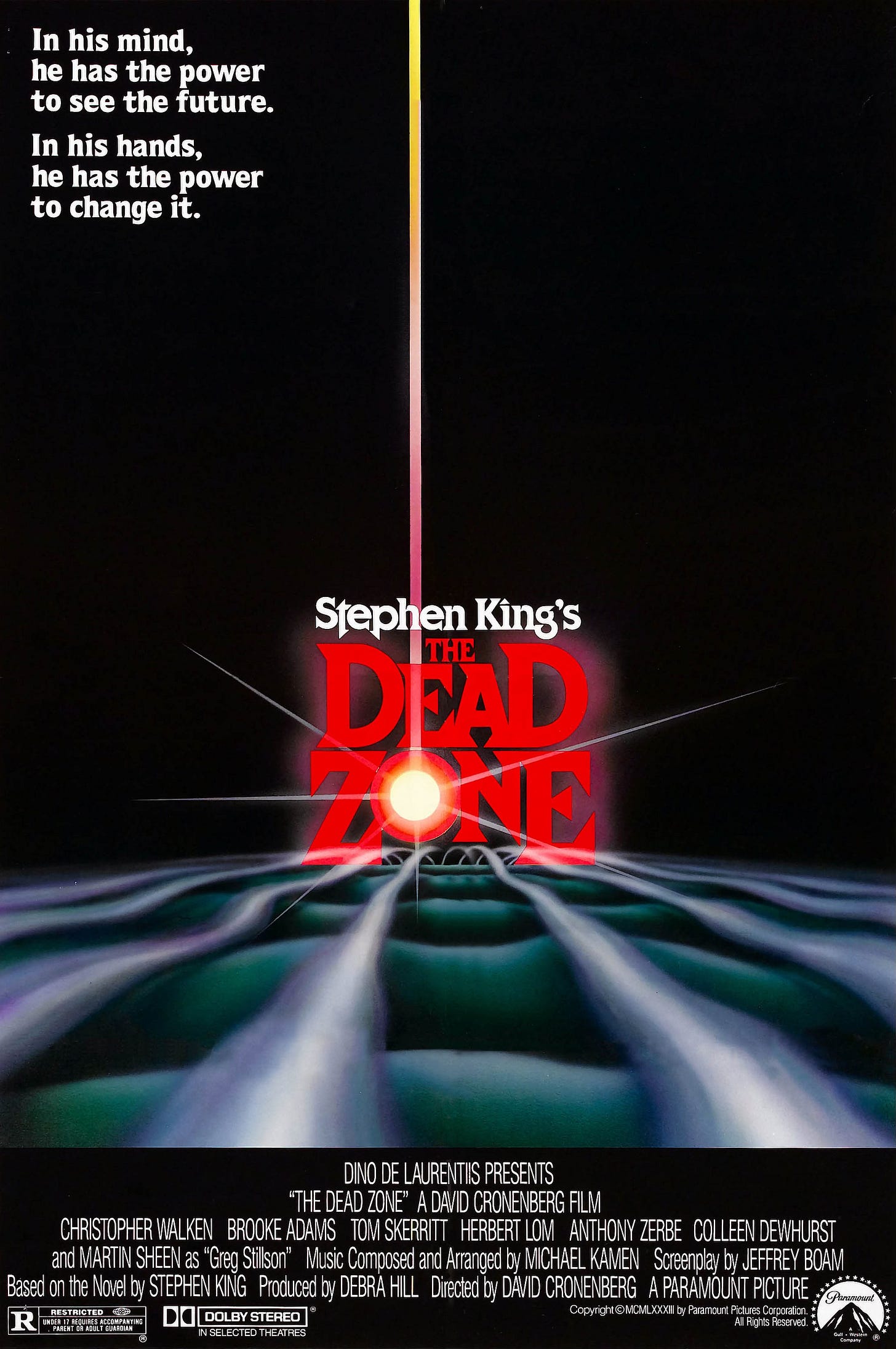
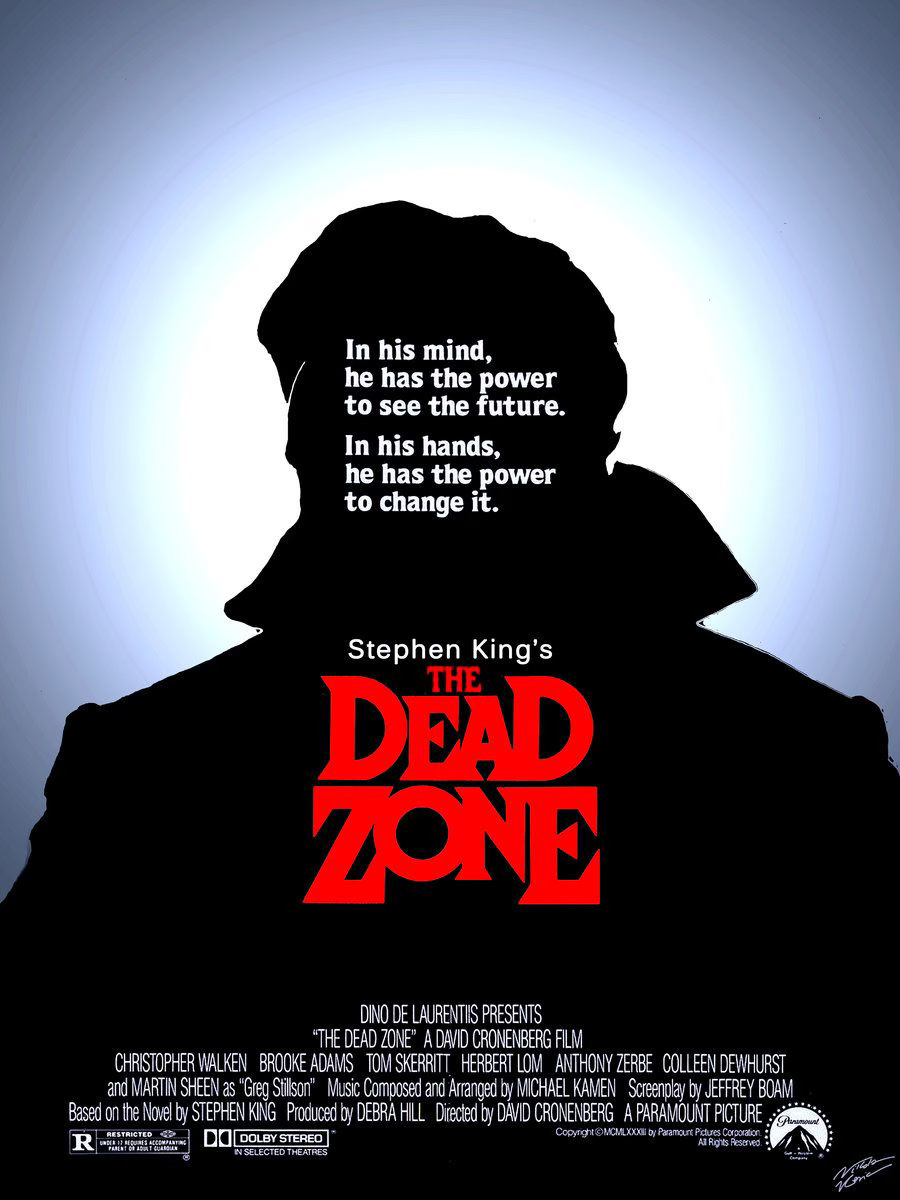
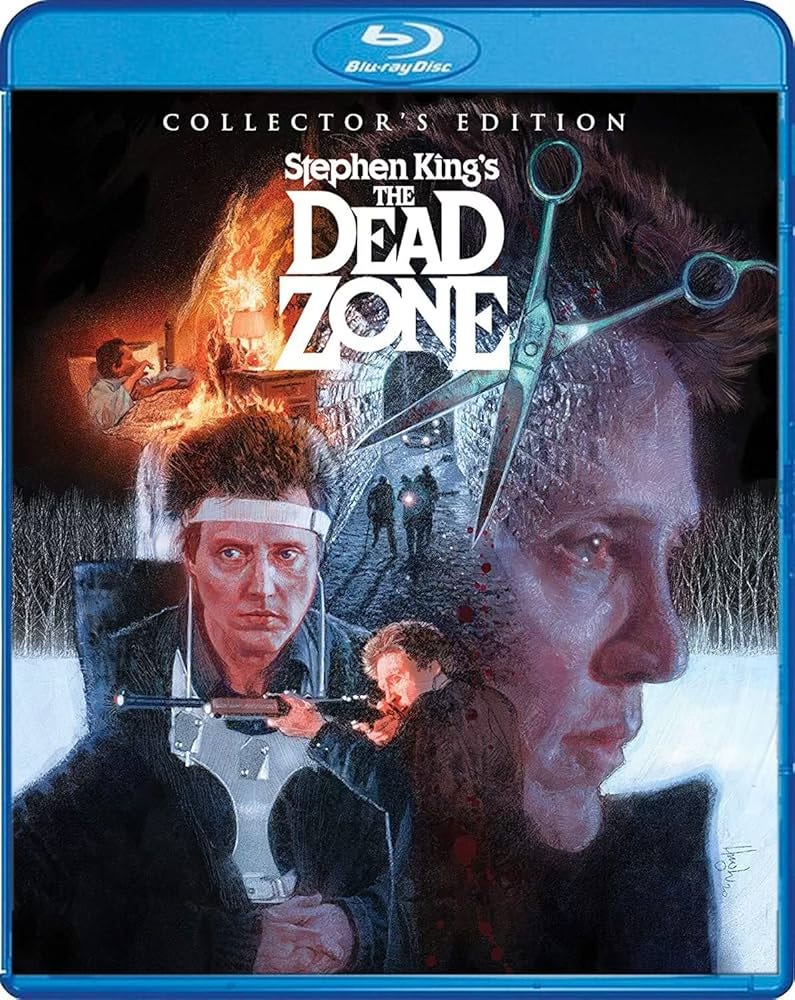
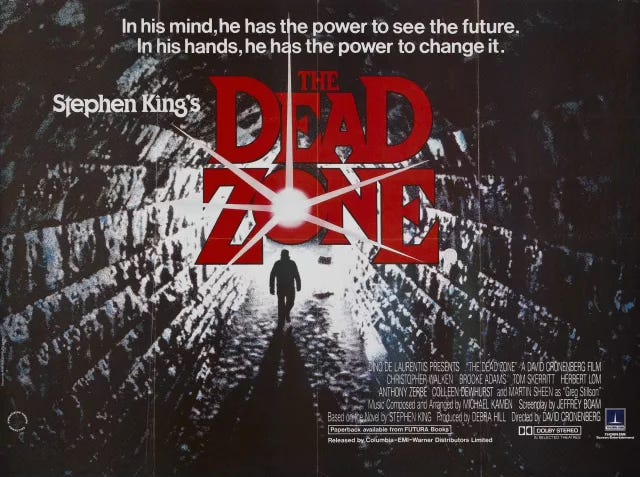
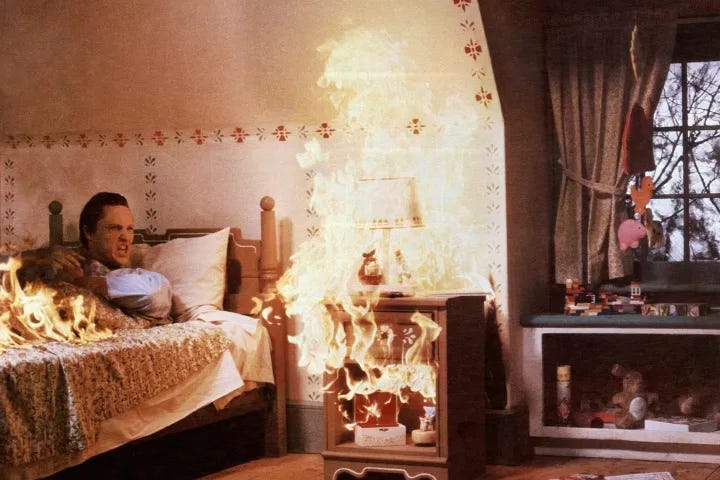
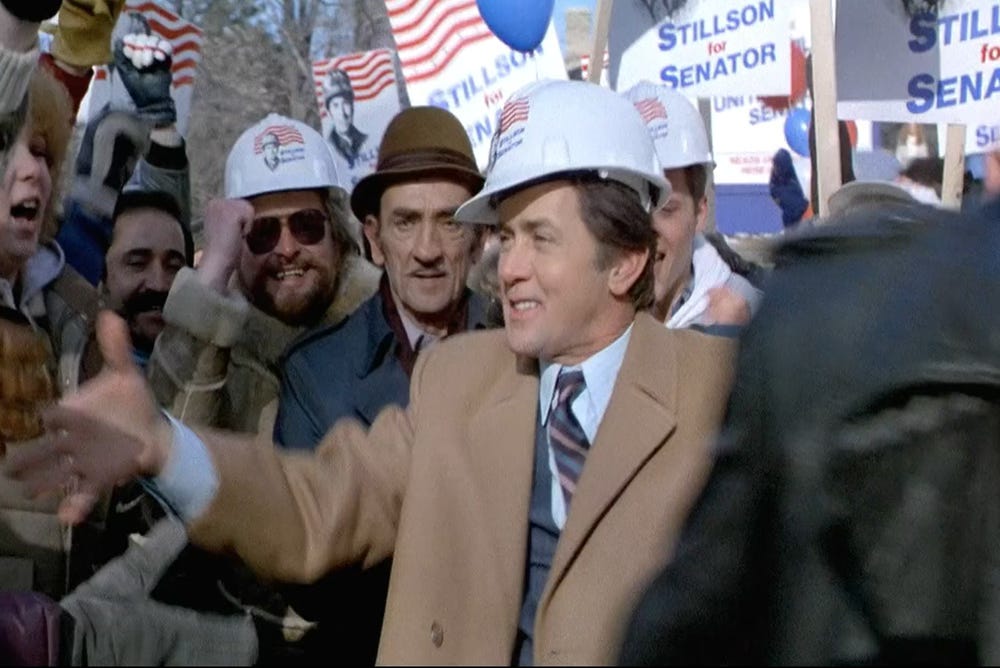
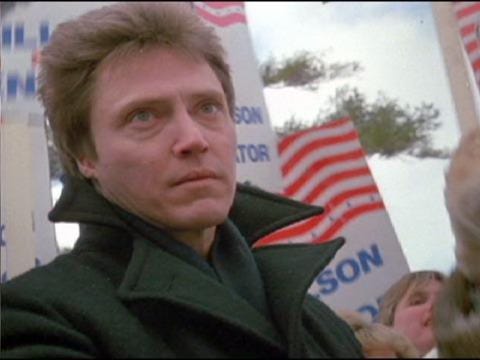
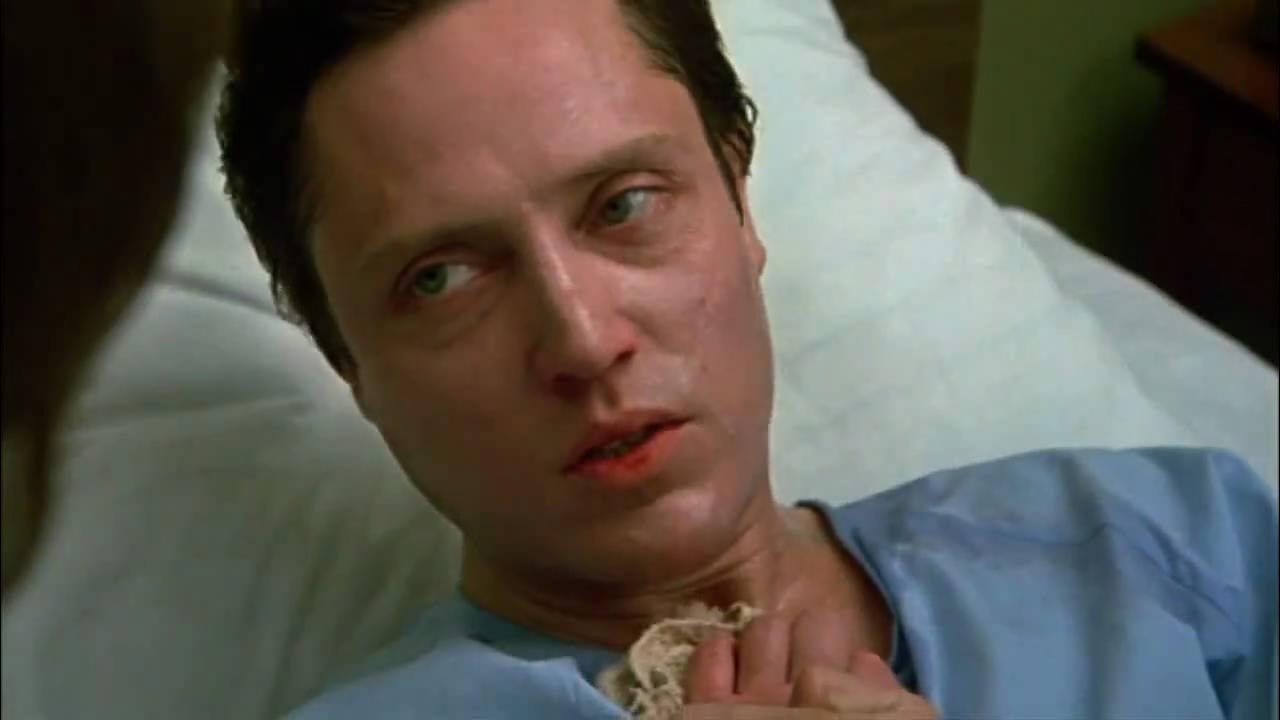
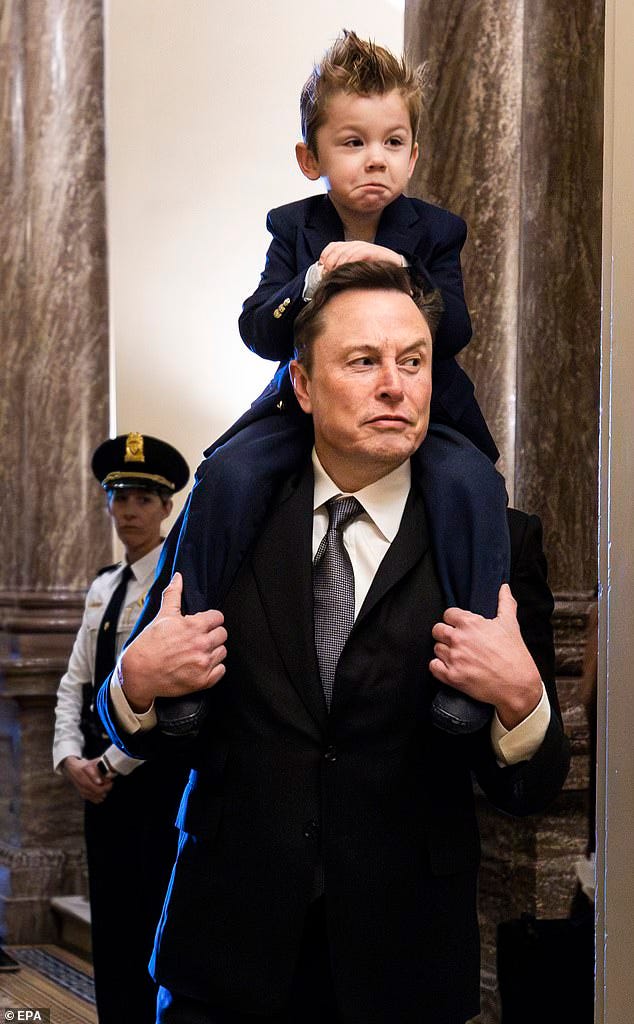
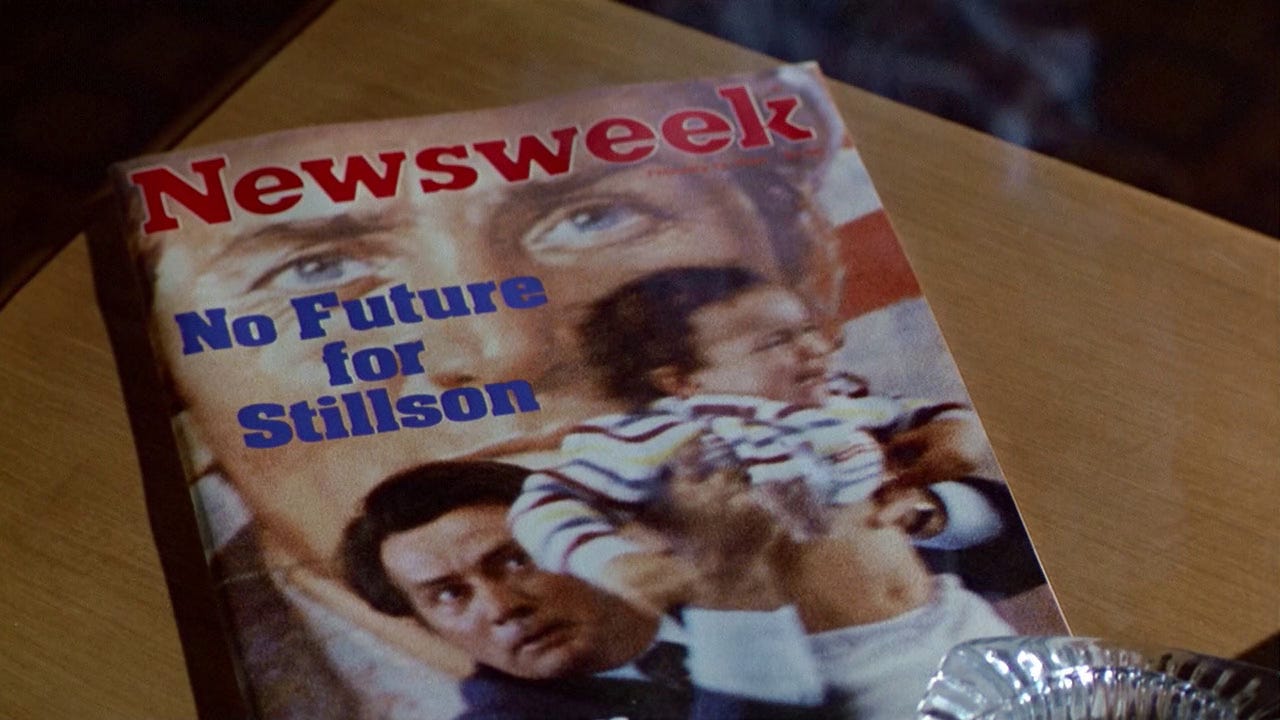
Almost sounds too much like our current world for me to watch right now.
Every David Cronnenberg movie I've seen has (to me) this one trait: they are as long as they need to be. Every time I watch one of his movies and I start to think "okay, I think this movie can end now," it does within five minutes. With "The Dead Zone," the length of this film is perfect. I cannot say about most movies.